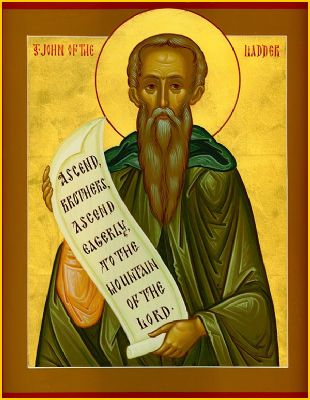|
|||
|---|---|---|---|
| This weekly bulletin insert complements the curriculum published by the Department of Christian Education of the Orthodox Church in America. This and many other Christian Education resources are available at http://dce.oca.org. | |||

Father John Climacus is known as a worker of miracles and as the writer of the "Ladder of Divine Ascent" in which he showed how a person can work step by step to come closer to God. The "steps" or rungs like those on a ladder were based on his own experience of prayer and asceticism. Because he did work hard to come close to God, Saint John was given spiritual insight. He could see that even someone who has repented of sin can be led into the trap of sinning again by judging another person. He wrote: "He who is inwardly proud of his own tears and condemns in his own mind those who do not weep, is like a man who begs weapons from the king against the enemy and kills himself with them." The "Prologue from Ochrid" offers this comment on Saint John's words: "If your heart has been softened either by repentance before God or by learning the boundless love of God towards you, do not be proud towards those whose hearts are still hard. Remember how long your heart was hard." Genesis 18: 20-33 begins with God telling His plans to Abraham. God says, "Because the outcry against Sodom and Gomorrah is great and their sin is very grave, I will go down to see whether they have done altogether according to the outcry which has come to me; and if not, I will know" (Genesis 18: 20-21). Abraham is a person whose heart has been softened by "learning the boundless love of God" towards him. His and Sarah's son Isaac, born in their old age after years of prayer and tears, is living proof of that love. So Abraham is ready to intercede even for the notoriously wicked people of Sodom. Having wept over his own sins, he will not "condemn in his own mind those who do not weep." Standing before God, Abraham draws near and asks a very bold question: "Wilt Thou indeed destroy the righteous with the wicked?" He even proposes terms on which God might base a change of mind: "Suppose there are fifty righteous within the city; wilt Thou then destroy the place and not spare it for the fifty righteous who are in it?"
Abraham has perfect confidence that his own merciful instincts have their source in the Lord to whom he is standing so close. So he says, "Far be it from Thee to do such a wicked thing, to slay the righteous with the wicked, so that the righteous fare as the wicked! Shall not the Judge of all the earth do right?" His confidence is rewarded when God agrees to spare Sodom if even ten righteous inhabitants can be found. Sodom proves too evil to be spared. But Abraham's intercession is the action of a once-hard heart that has been softened. As a result, it seeks only mercy for others. |
|||
